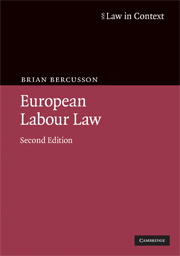Book contents
- Frontmatter
- Contents
- Preface
- Section I Labour law and Europe
- Section II The structure of European labour law
- 8 The institutional architecture of the European social model
- 9 A framework of principles and fundamental rights for European collective labour law
- 10 A framework of principles and fundamental rights for European individual employment law
- 11 The European Court of Justice, the EU Charter of Fundamental Rights and the European social model
- 12 General principles of enforcement of European labour law
- 13 Administrative enforcement of European labour law
- 14 Implementation and enforcement of European labour law and employment policy through the social partners at national and EU levels
- 15 Individual judicial enforcement of European labour law
- 16 Euro-litigation: collective judicial enforcement of European labour law
- 17 The European social dialogue: from dynamism to benign neglect 1993–2008
- 18 External and internal scrutiny of the democratic legitimacy of the European social dialogue
- 19 Threats and challenges to and the future of the European social dialogue
- Section III The futures of European labour law
- Index
- References
13 - Administrative enforcement of European labour law
from Section II - The structure of European labour law
Published online by Cambridge University Press: 05 June 2012
- Frontmatter
- Contents
- Preface
- Section I Labour law and Europe
- Section II The structure of European labour law
- 8 The institutional architecture of the European social model
- 9 A framework of principles and fundamental rights for European collective labour law
- 10 A framework of principles and fundamental rights for European individual employment law
- 11 The European Court of Justice, the EU Charter of Fundamental Rights and the European social model
- 12 General principles of enforcement of European labour law
- 13 Administrative enforcement of European labour law
- 14 Implementation and enforcement of European labour law and employment policy through the social partners at national and EU levels
- 15 Individual judicial enforcement of European labour law
- 16 Euro-litigation: collective judicial enforcement of European labour law
- 17 The European social dialogue: from dynamism to benign neglect 1993–2008
- 18 External and internal scrutiny of the democratic legitimacy of the European social dialogue
- 19 Threats and challenges to and the future of the European social dialogue
- Section III The futures of European labour law
- Index
- References
Summary
Introduction
The EU institutions do not possess the resources which can even begin to equate to the resources of national Ministries of Labour or labour inspectorates. The original vision might have been that the EU itself should police observance by the Member States of their obligations. To this end, complaints by the Commission of non-compliance by Member States have sometimes had important consequences. However, the procedure of administrative enforcement through Commission complaint is extremely slow: failure to comply with EU legislation is condemned often more than a decade later. An illustration of the inefficacy of the procedure is the case of Italy, using an example of administrative enforcement of labour law which culminated in the European Court condemning Italy in 1989. First, the context of the judgment.
By the end of 1988, the number of EC directives in effect were 622, and Italy had up to then failed to implement 278, for 196 of which the date for implementation had already passed, and for 48 of these last the expiry date for implementation was over five years previously. Italy was one of the countries most frequently condemned by the European Court for violating its EU obligations. Up to the end of 1988 there were 34 judgments condemning Italy which had not been complied with, and another 28 proceedings pending; moreover, there were five cases where Italy had been condemned twice for the same failure to comply, including failure to implement Directive 75/129 of 17 February 1975 on collective dismissals.
- Type
- Chapter
- Information
- European Labour Law , pp. 417 - 449Publisher: Cambridge University PressPrint publication year: 2009
References
- 1
- Cited by



